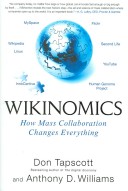
Wikinomics, by Don Tapscott and Anthony D. Williams, is a book written for business. As the name implies, they are interested in the economic potential of Web 2.0, providing insightful analysis of the collaborative culture that has grown on the internet over the last decade and recommendations for how businesses can adopt beneficial practices of this culture. While I think the book could have been improved by a less accepting, optimistic view of this technology, it is otherwise a helpful introduction to many of the features of Web 2.0 that are relevant to businesses.
Synopsis
According to Tapscott and Williams, there are four principles of Wikinomics: openness, peering, sharing, and acting globally. By openness, they mean that businesses must become less proprietary, arguing that in the current economic climate, businesses can’t afford to hoard all of their valuable information. Rather, they need to make it open so as to increase their ability to research and discover new products, as well as to make use of new standards for sharing information. For example, few businesses have the ability to throughly research and analyze all of the data available to them; by making some of that data open, Tapscott and Williams argue that businesses can harness the benefits of having an increased number of eyeballs looking for problems and new opportunities that would otherwise languish in forgotten data.
With peering the authors argue that the hierarchical relationships that dominate most large-scale enterprises should be broken down and replaced by more flexible peer-production methods, like those used in open source projects such as the Linux operating system. Tapscott and Williams argue that by taking advantage of peer-production methods, businesses can leverage the self-organizing forces to make better decisions and create better products without expending more capital.
While the idea of sharing that Tapscott and Williams advocate is likely to be as counter-intuitive as their other Wikinomics ideas, it is less radical and less dependent on new technologies than peering. The authors argue that, instead of keeping intellectual property like patents proprietary, business should open up their IP holdings for licensing by outside entities. By doing so, businesses can have access to more revenue through licensing fees, and also create new product lines by collaborative relationships with other businesses. Like peer-production, sharing allows for new relationships to form that would likely be ignored by businesses focusing on core products and competencies. These new relationships would benefit from self-organizing, emergent effects that lead to new opportunities without demanding heavy investment in research and development or new personnel.
Finally, the increased reach of the web, coupled with faster connections and greater computing horsepower, have enabled what were previously global interactions—a conversation with a supplier in another country, for example—to feel local and instantaneous. For this reason, the authors argue that businesses need to act globally, taking advantage of their ability to coordinate with suppliers and employees across the world.
Open cultures
I found that the most compelling part of the text was its focus on the culture of open enterprises. Tapscott and Williams continually emphasize that to take advantage of the changing economic and technological landscape, businesses must be ready to change their internal cultures and adopt the cultural practices of the community—Linux, Wikipedia—they wish to emulate. According to them, open, peer-production networks have distinct cultures that have to not only be respected by business, but also be leveraged if they wish to make use of the benefits of those networks. In my research of Wikipedia and other peer-produced systems, I’ve been interested in the ways that peer-produced texts depend on the creation of a community of value; that is, the creation of a culture that provides content creators with a return on their investment of time in the project. I think Tapscott and Williams correctly identify this feature of open source projects and argue for its acceptance by those who would use these methods of production in their business.
If I had to make a complaint about the book, I think it would be that the authors take for granted the benefits that “Wikinomics” will bring to business. While it is somewhat normal for those advocating new technologies to gush about their benefits and turn a blind eye to their potential drawbacks, I did get a little tired of the repeated insistence that these new economic forces were going to completely transform business practices for the better. I agree that there are tremendous benefits to the ideas that Tapscott and Williams outline here, I would have enjoyed a more critical approach to their benefits and drawbacks as well. However, that one quibble didn’t ruin the book for me, and I think it is still a valuable introduction to the theory of open source production.
Wednesday, February 06, 2008
Review: Tapscott and Williams, Wikinomics: How Mass Collaboration Changes Everything (2006)
Posted by
John Jones
at
1:04 PM
![]()
![]()
Tags: collaboration, Emergence, open source, Review, Web 2.0, wiki
Subscribe to:
Post Comments (Atom)
No comments:
Post a Comment